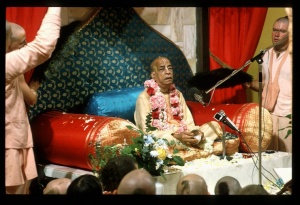CC Adi 5.221

A.C. Bhaktivedanta Swami Prabhupada
TEXT 221
- yāṅra dhyāna nija-loke kare padmāsana
- aṣṭādaśākṣara-mantre kare upāsana
SYNONYMS
yāṅra — of whom; dhyāna — the meditation; nija-loke — in his own abode; kare — does; padma-āsana — Lord Brahmā; aṣṭādaśa-akṣara-mantre — by the hymn composed of eighteen letters; kare — does; upāsana — worshiping.
TRANSLATION
Lord Brahmā, sitting on his lotus seat in his own abode, always meditates on Him and worships Him with the mantra consisting of eighteen syllables.
PURPORT
In his own planet, Lord Brahmā, with the inhabitants of that planet, worships the form of Lord Govinda, Kṛṣṇa, by the mantra of eighteen syllables, klīṁ kṛṣṇāya govindāya gopī-jana-vallabhāya svāhā. Those who are initiated by a bona fide spiritual master and who chant the Gāyatrī mantra three times a day know this aṣṭādaśākṣara (eighteen-syllable) mantra. The inhabitants of Brahmaloka and the planets below Brahmaloka worship Lord Govinda by meditating with this mantra. There is no difference between meditating and chanting, but in the present age meditation is not possible on this planet. Therefore loud chanting of a mantra like the mahā-mantra, Hare Kṛṣṇa, with soft chanting of the aṣṭādaśākṣara, the mantra of eighteen syllables, is recommended.
Lord Brahmā lives in the highest planetary system, known as Brahmaloka or Satyaloka. In every planet there is a predominating deity. As the predominating deity in Satyaloka is Lord Brahmā, so in the heavenly planets Indra is the predominating deity, and on the sun, the sun-god, Vivasvān, is the predominating deity. The inhabitants and predominating deities of every planet are all recommended to worship Govinda either by meditation or by chanting.